149
TOP-5 household tips from Domostroy
In the minds of the layman, Domostroy is associated with the dark Middle Ages, cruelty and family violence. Propaganda, including Soviet propaganda, played a role in shaping this opinion. Its purpose was to create an image of the kingdom of darkness, ignorance and complacency that was old Russia.
In support of these patterns, the opponents of the patriarchal way of the family cite quotes about calls for the use of force against their household members, which are present in this monument of Russian literature of the XVI century. It is not for nothing that people who want to describe the life of a bad family, where children and wife are in constant fear because of the beatings of a bully father, use the horror word “Domostroy”.
There are mentions of assault in this book, but they, according to the historian Dmitry Volodykhin, are only partial, marginal in the fields. In reality, “Domostroy” was a truly revolutionary work for its time, calling the reader to love, sanity and care for his family in the harsh realities of the ancient Russian state. Consider the main instructions from Domostroy, the authorship of which is attributed to Protopope Sylvester.
Teach, Father!
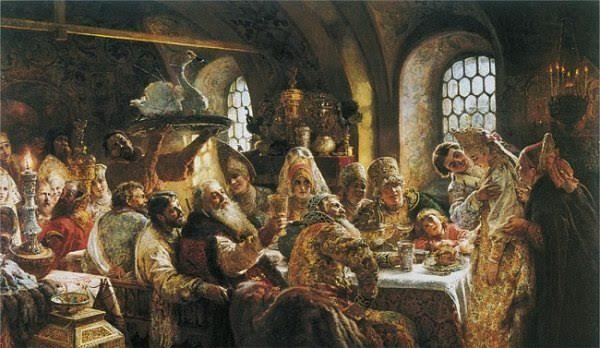
Perhaps the main message that passes through the whole book can be formulated as follows: the head of the family is obliged to teach his household business, economy and the basics of spiritual life.
The head of the family is obliged to teach his household business
Here is what the author of Domostroy says about this: “And God will send to whom children – sons or daughters – then take care of their children to their father and mother, provide them and educate them in good instruction; teach God’s fear and politeness and all order, and then, depending on their age, teach them handicrafts – the mother of daughters and skill – the father of sons; who is capable of what God will give to whom; love them and protect them.” And he instructs his wife, and also his household, not by force, not by beatings, not by grave slavery, but as children, so that they may be always rested, fed and clothed, and in a warm house, and always in order. If children sin because of their father’s or mother’s negligence, they will be held accountable for such sins on the Day of Judgment. So if children who are deprived of the teachings of fathers and mothers, in what they sin or do evil, then fathers and mothers are sinful from God, and from people reproach and ridicule, home is loss, and themselves grief and damage, from judges and penalties and shame.
Keep God's commandments.
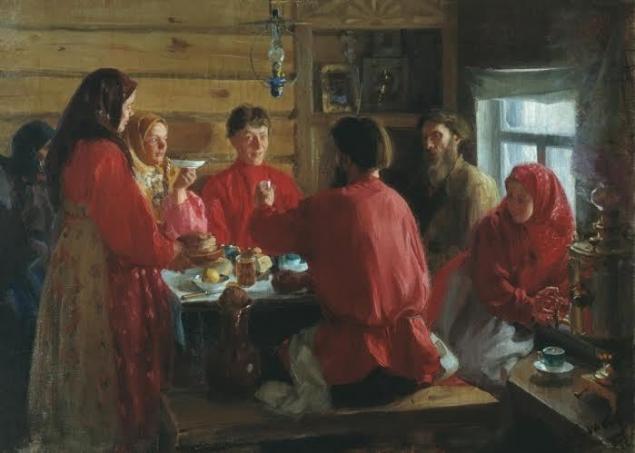
The basis of a prosperous life of all family members according to Domostroy is the observance of the commandments. In this part, the author of the book merely retells the main instructions for every Christian from the Holy Scriptures: “To you, the master, and wife, and children, and households, do not steal, do not fornicate, do not lie, do not slander, do not envy, do not offend, do not judge, do not judge, do not laugh, do not remember evil, do not be angry with anyone, to be obedient and submisssive, to the middle ones, to avoid God, and do not insult, but do not take any kindness for the sake of any kindness, and humiliation, and do not take any kindness for the sake of any kindness, and kindness. If you are not guilty of anything, you will receive a reward from God.
The basis of the life of all family members - the observance of the commandments
COPY FORGET
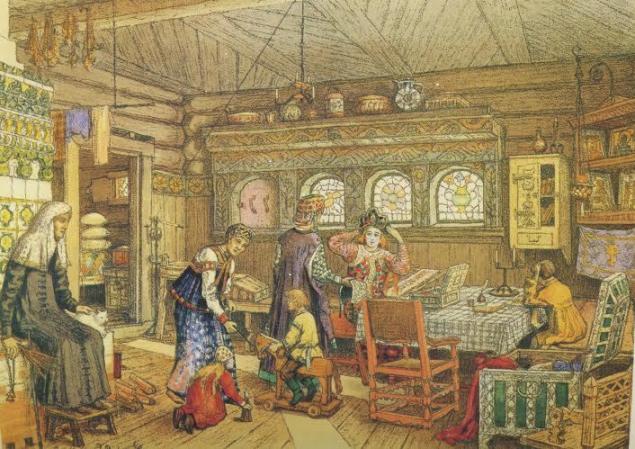
Throughout the story, the reader of Domostroy is faced with appeals to the head of the family to tirelessly care for the well-being of their loved ones, careful household management and everyday life. In other words, the father is obliged to provide full material support, and if he has a daughter, then from a very young age it is necessary to begin to accumulate a dowry for the future bride: “Reasonable people from any profit put on the daughter: her name or belly is raised with offspring, or from canvases, and from canvases, and from pieces of cloth, and from ubruses, and shirts all these years put her in a special chest and dress, and monist, and church utensils, and tin utensils, and always add to themselves, but not to add everything.”
The father is obliged to provide full material security.
Take care of your youth.
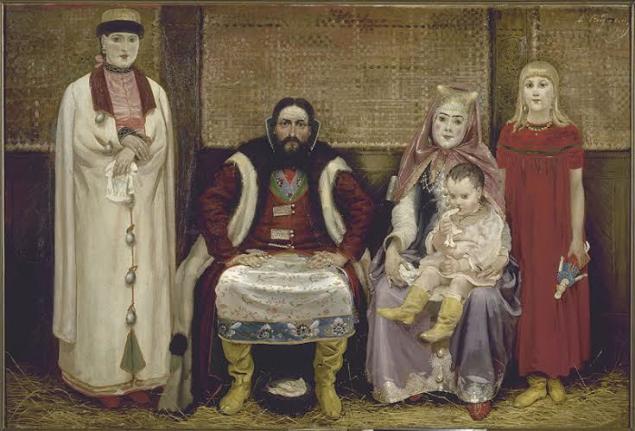
“Domostroy” strongly advises fathers to protect the reputation of a kind and make sure that it is not spoiled by children. Neither the head of the family nor his household in connection with this is not allowed to drink, fornicate, “shame”, vilify the authorities, gossip. If even one member of the family acquires the reputation of a bad person, a dark spot will fall on the whole family and future generations.
"Domostroy" strongly advises fathers to protect the reputation of a kind
To preserve the honor of the young, “Domostroy” advises, in particular, to be restrained in everything, not to stay away, and at the same time always be hospitable and courteous.
Taboo on reckless aggression
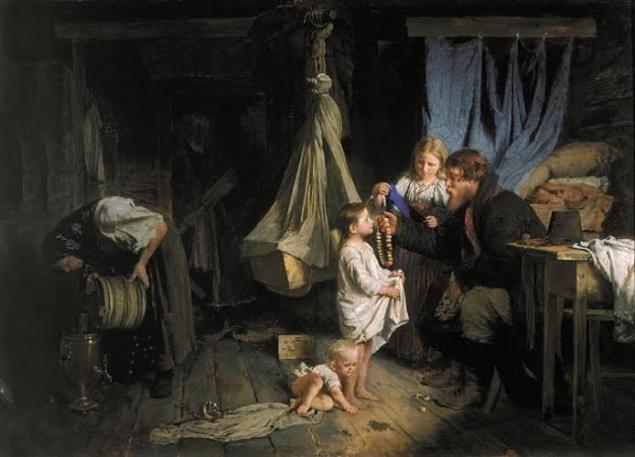
© Korzukhin, Alexei Ivanovich "Return from the city", (1870)
You might ask, “Doesn’t there really talk about corporal punishment?” It is said, but the use of force in this book is severely limited and described as an inevitable necessity in extreme cases. At the same time, the punishment itself should occur without malice, with a sincere desire to benefit and instruct the household, which then must be pityed.
In the case of good people, in the case of an economic wife, the house is always clean and arranged—everything is properly hidden, where it is necessary, and is always cleaned and swept up: to enter such an order as paradise. - Explains the author of "Domostroy".
- But the husband will see that the wife is not in the order of the servants, or not as everything is stated in this book, he would be able to instruct his wife to teach and teach with useful advice; if she understands, then everything is done, and love her, and praise, but if the wife does not follow such instruction to science, and does not do all this, and she herself does not know any of this, and does not teach servants, the husband must punish his wife and admonish him in private fear, and punish him, forgive, and chant, and instruct her with love, and teach, but at the same time neither does the husband live in harmony and in love. And servants and children, also depending on their fault and deed, punish and punish, and punish, regret.”
Given the harsh nature of the medieval Russian, the compiler of the book separately emphasizes the inadmissibility of cruelty and harm to the health of family members.
published
P.S. And remember, just by changing our consumption, we change the world together! © Join us on Facebook , VKontakte, Odnoklassniki
Source: diletant.media/articles/26469623/
In support of these patterns, the opponents of the patriarchal way of the family cite quotes about calls for the use of force against their household members, which are present in this monument of Russian literature of the XVI century. It is not for nothing that people who want to describe the life of a bad family, where children and wife are in constant fear because of the beatings of a bully father, use the horror word “Domostroy”.
There are mentions of assault in this book, but they, according to the historian Dmitry Volodykhin, are only partial, marginal in the fields. In reality, “Domostroy” was a truly revolutionary work for its time, calling the reader to love, sanity and care for his family in the harsh realities of the ancient Russian state. Consider the main instructions from Domostroy, the authorship of which is attributed to Protopope Sylvester.
Teach, Father!

Perhaps the main message that passes through the whole book can be formulated as follows: the head of the family is obliged to teach his household business, economy and the basics of spiritual life.
The head of the family is obliged to teach his household business
Here is what the author of Domostroy says about this: “And God will send to whom children – sons or daughters – then take care of their children to their father and mother, provide them and educate them in good instruction; teach God’s fear and politeness and all order, and then, depending on their age, teach them handicrafts – the mother of daughters and skill – the father of sons; who is capable of what God will give to whom; love them and protect them.” And he instructs his wife, and also his household, not by force, not by beatings, not by grave slavery, but as children, so that they may be always rested, fed and clothed, and in a warm house, and always in order. If children sin because of their father’s or mother’s negligence, they will be held accountable for such sins on the Day of Judgment. So if children who are deprived of the teachings of fathers and mothers, in what they sin or do evil, then fathers and mothers are sinful from God, and from people reproach and ridicule, home is loss, and themselves grief and damage, from judges and penalties and shame.
Keep God's commandments.

The basis of a prosperous life of all family members according to Domostroy is the observance of the commandments. In this part, the author of the book merely retells the main instructions for every Christian from the Holy Scriptures: “To you, the master, and wife, and children, and households, do not steal, do not fornicate, do not lie, do not slander, do not envy, do not offend, do not judge, do not judge, do not laugh, do not remember evil, do not be angry with anyone, to be obedient and submisssive, to the middle ones, to avoid God, and do not insult, but do not take any kindness for the sake of any kindness, and humiliation, and do not take any kindness for the sake of any kindness, and kindness. If you are not guilty of anything, you will receive a reward from God.
The basis of the life of all family members - the observance of the commandments
COPY FORGET

Throughout the story, the reader of Domostroy is faced with appeals to the head of the family to tirelessly care for the well-being of their loved ones, careful household management and everyday life. In other words, the father is obliged to provide full material support, and if he has a daughter, then from a very young age it is necessary to begin to accumulate a dowry for the future bride: “Reasonable people from any profit put on the daughter: her name or belly is raised with offspring, or from canvases, and from canvases, and from pieces of cloth, and from ubruses, and shirts all these years put her in a special chest and dress, and monist, and church utensils, and tin utensils, and always add to themselves, but not to add everything.”
The father is obliged to provide full material security.
Take care of your youth.

“Domostroy” strongly advises fathers to protect the reputation of a kind and make sure that it is not spoiled by children. Neither the head of the family nor his household in connection with this is not allowed to drink, fornicate, “shame”, vilify the authorities, gossip. If even one member of the family acquires the reputation of a bad person, a dark spot will fall on the whole family and future generations.
"Domostroy" strongly advises fathers to protect the reputation of a kind
To preserve the honor of the young, “Domostroy” advises, in particular, to be restrained in everything, not to stay away, and at the same time always be hospitable and courteous.
Taboo on reckless aggression

© Korzukhin, Alexei Ivanovich "Return from the city", (1870)
You might ask, “Doesn’t there really talk about corporal punishment?” It is said, but the use of force in this book is severely limited and described as an inevitable necessity in extreme cases. At the same time, the punishment itself should occur without malice, with a sincere desire to benefit and instruct the household, which then must be pityed.
In the case of good people, in the case of an economic wife, the house is always clean and arranged—everything is properly hidden, where it is necessary, and is always cleaned and swept up: to enter such an order as paradise. - Explains the author of "Domostroy".
- But the husband will see that the wife is not in the order of the servants, or not as everything is stated in this book, he would be able to instruct his wife to teach and teach with useful advice; if she understands, then everything is done, and love her, and praise, but if the wife does not follow such instruction to science, and does not do all this, and she herself does not know any of this, and does not teach servants, the husband must punish his wife and admonish him in private fear, and punish him, forgive, and chant, and instruct her with love, and teach, but at the same time neither does the husband live in harmony and in love. And servants and children, also depending on their fault and deed, punish and punish, and punish, regret.”
Given the harsh nature of the medieval Russian, the compiler of the book separately emphasizes the inadmissibility of cruelty and harm to the health of family members.
published
P.S. And remember, just by changing our consumption, we change the world together! © Join us on Facebook , VKontakte, Odnoklassniki
Source: diletant.media/articles/26469623/























